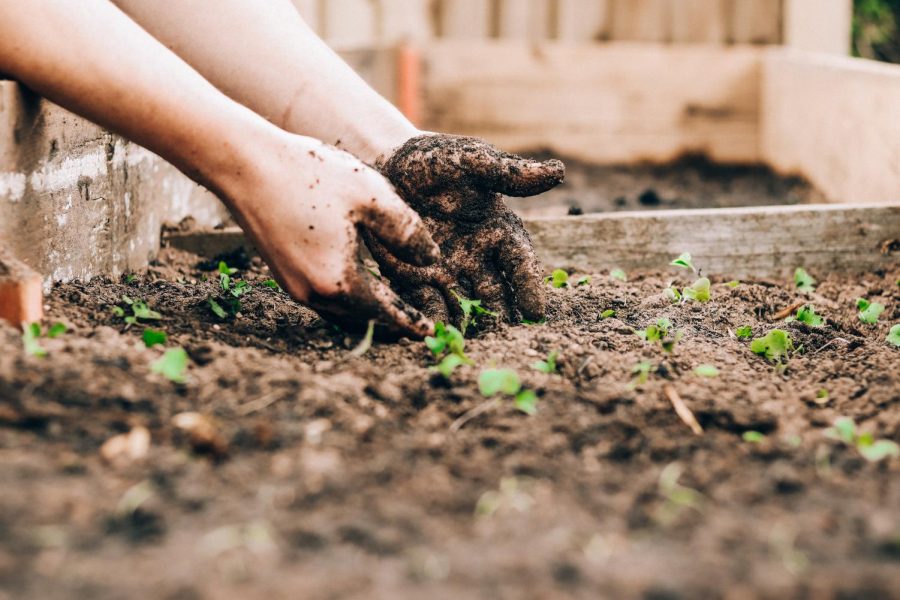- Beavers Digest / Cascades
- Beavers Digest / Cascades / Experience
- Beavers Digest / Culture
- Beavers Digest / Culture / Businesses
- Beavers Digest / Culture / Community
- Beavers Digest / Culture / Expression
- Beavers Digest / Experience
- Beavers Digest / Experience / Create
- Beavers Digest / Experience / Outdoors
Growing into a new hobby
Photo Courtesy of Sandie Clarke via Unsplash, from the 2022 archives
A pair of muddy hands plant seedlings in their garden.
June 8, 2022
As the sun starts to come out more, gardening can be a fun pastime as spring slowly turns into summer. Before you swap out your rain boots for some gardening gloves, here are some tips a novice gardener should know.
Figuring out the needs of your garden is a good first step before deciding on what plants or flowers you want to grow, according to Maddy, Susan’s Garden and Coffee Shop shift lead. What to consider includes what kind of sun and space you have. Maddy suggests planting a perennial if you want to plant something that comes back every year.
Erica Chernoh, Department of Horticulture assistant professor, recommends planting zinnias, marigolds and cosmos because they’re easy to grow. Those flowers also attract pollinators and beneficial insects to the garden while adding color.
“There’s a certain percentage of plants that are dependent on pollinators in order to complete their life cycle, so I’d say they are incredibly important in and around our garden,” Chernoh said. “We should all be doing what we can to protect them and provide habitat for them as well.”
There are certain plants that are native to Oregon that can adapt to the climate better, according to Claire, Susan’s Garden and Coffee Shop shift lead. These include wildflowers and wild plants that are sold in their shop’s greenhouse.
According to Chernoh, native plants are a great place to start since they’re already adapted to the soil in this region. These pants are also drought tolerant which is something people might be looking for as the summer gets hotter and drier.
Claire said people should definitely start their gardens with some good soil. Gardening tools like gloves and shovels are important to get. Getting a specific fertilizer for your plants that range from a variety of different ones is helpful too, she added.
“You might have to do a soil test to get started,” Claire said. “[Oregon State University] has a soil testing place that you can send your sample to and they can tell you what your soil needs. Does it need nutrients? Does it need organic matter? A lot of people are concerned about the pH of their soil and they can help with that as well.”
Chernoh recommends starter tools such as digging forks, shovels, rakes, or wheelbarrows. She said it depends on what people are trying to do and what their goals are for their garden—some people might be doing tillage or just building lasagna beds.
To face various weather conditions, Claire recommends using polyvinyl sheets for your garden. This can be used to cover plants when it’s too rainy or if it snows. Drip irrigation can also be used in the summer to keep plants watered, she noted.
“Some plants need a little more protection, like tomatoes and peppers don’t like to be cold,” Maddy said. “Some plants are just geared toward the outdoor conditions. I think just making sure you plant the right thing at the right time is the most important thing.”
Chernoh said it’s good to know the landscape, like where the sun falls and where water tends to pool in certain parts of your garden. Selecting the right plants for those areas like plants that love the sun or are more tolerant of shade is important to keep in mind.
“We really teach ‘right plant, right place,’” Chernoh said. “You have a backyard, most likely there’s going to be parts of that yard that are more shady than other parts and others with a bit more sun.”
With the summer season on the horizon, plants will be able to sustain the heat by getting watered enough, according to Maddy. It’s also best to use soils with good moisture retention and as a way to use less water. Good soil with mulch will keep water from evaporating.
“I always recommend drip irrigation,” Chernoh said. “As the temperatures continue to rise, I think water conservation is going to be more important, so if folks can use drip instead of sprinkler irrigation, that’s a great way to conserve water.”
Chernoh added that it’s good to use mulch around the garden such as wood chips or dry grass clippings depending on the type of garden. Mulch helps to conserve soil moisture by preventing evaporation.
Being conscious of the weather forecast and being prepared by watering your plants ahead of time or moving them out of the sun will keep them from being torched, Chernoh noted. These are precautions that can be taken including covering your plants with shade cloth.
“Don’t be afraid to experiment and have fun and don’t be too hard on yourself if things go wrong as well,” Chernoh said. “That’s quite normal, even people who have been gardening for decades will have things fail in their garden every year for various reasons. It’s okay, and just keep going and keep learning along the way.”
Chernoh said there are a lot of great resources through OSU Extension. They have many free online publications on gardening tips for beginner gardeners.
Claire recommended being mindful about what you are putting into the ground when starting your garden. All the types of fertilizers and chemicals don’t just get absorbed by your plants, it also goes into the soil and maybe the river system, she added.
“Using only as much as you need is a really good thing to keep in mind,” Claire said.
According to Maddy, getting out and having fun, enjoying your time in the garden and planting plants that make you happy are also good to remember.






